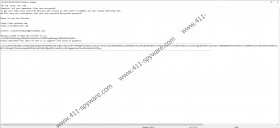Pashka Ransomware Removal Guide
Pashka Ransomware slithers in silently. It has to be quiet; otherwise, the targeted users might have a chance to recognize malware and remove it before it is executed. The threat also has to invade systems that lack reliable protection because if security software is installed, the threat should be eliminated automatically before execution. Obviously, if a system is not protected, and if the threat manages to remain concealed, it has nothing stopping it from execution. The saddest part is that victims of this malware are usually involved in its entrance because it usually hides within bundled downloaders, fake installers, and spam emails. That means that users have to open/download/install something for the threat to slither in. Once this initial hurdle is passed, the infection encrypts files, and there is no return from that. You might be trying to delete Pashka Ransomware to get your files back, but that will not work. That being said, the threat needs to be eliminated as soon as possible.
Did you find a file named “HELP_ME_RECOVER_MY_FILES.txt” close to the encrypted files? This file is dropped by Pashka Ransomware, and you can open it safely. The note inside informs that files were corrupted and that you need to obtain a unique decryption password and a decryption tool to have your files restored. The ransom is 0.3 Bitcoin, which is much bigger than it might appear to be at first. In fact, when our research team analyzed the threat, 0.3 Bitcoin converted to 2,807 US Dollars. Some victims might find this ransom to be impossibly big, and others might be able to pay it. Regardless of your financial situation, we do not recommend doing that. 3LtZ1DRUTupWFdxkgyTyMDa2AYEcNio4Pu is the address of a Bitcoin wallet that belongs to the attackers behind Pashka Ransomware. When we looked it up, it was empty, which gives us hope that it is not spreading actively or that victims are not getting fooled. The bottom line is that if you pay the ransom, you are unlikely to get anything in return.
The Pashka Ransomware ransom note also lists unlockransomware@protonmail.com as an email address that you can use to contact the attackers. You might think that it is a good idea to email them and perhaps strike a different deal. That will not work. You have nothing to offer them, and they do not care what happens to your files. All in all, whether you pay $2,807 or $1, the attackers are unlikely to restore your files. Unfortunately, Pashka Ransomware encrypts most personal files in %HOMEDRIVE%, %PROGRAMFILES%, and %USERPROFILE% directories. The threat does not encrypt everything, but it certainly can encrypt documents, photos, and media files. These are likely to be most valuable to you, and the attackers might have a better chance of convincing you to pay the ransom. You should not do that. Even though legitimate free decryptors do not exist – at least, not at the time of research – perhaps you can replace the affected files using backups? Remember to always backup your photos, documents, and other personal files outside the main location (i.e., the computer) to keep them safe.
You need to locate and remove Pashka Ransomware launcher if you have the desire to eliminate this threat all by yourself. Luckily, no other malicious files are dropped by this threat, and the only other thing that you need to delete is the ransom note file. Do not panic if you cannot locate the launcher and delete Pashka Ransomware manually. It is best to utilize anti-malware software anyway. This software can automatically examine the system, identify threats, and also perform removal. On top of that, it can ensure that your operating system remains protected against new malware attacks. If you do not secure your system, a different file-encryptor could invade! Also, there are plenty of other kinds of infections that can cause you harm in different ways. If you install legitimate anti-malware software, backup personal files outside the computer, and also stay cautious when opening spam emails or installing software, you should be able to evade threats in the future.
How to delete Pashka Ransomware
- Delete recently acquired suspicious files.
- Delete the ransom note file, HELP_ME_RECOVER_MY_FILES.txt.
- Empty Recycle Bin to complete the removal of the threat.
- Employ a trusted malware scanner to examine your system for leftovers.
Pashka Ransomware Screenshots:


